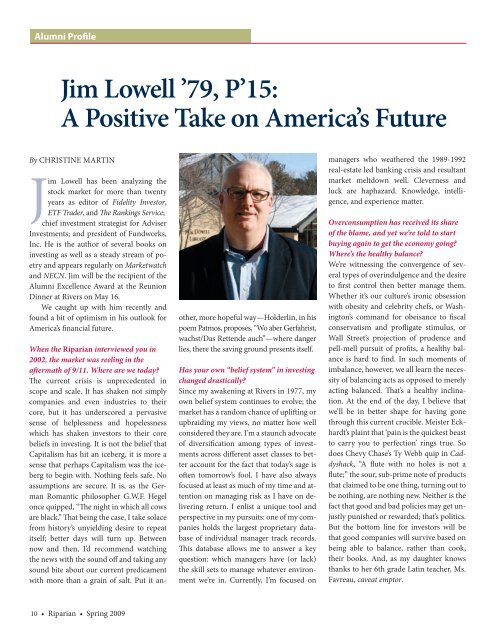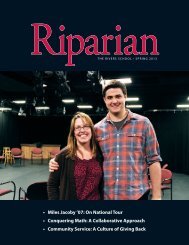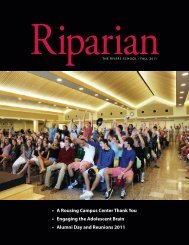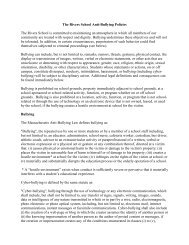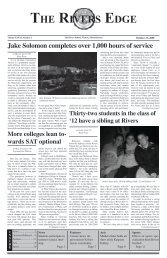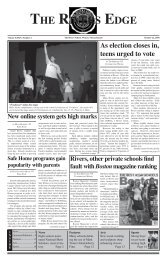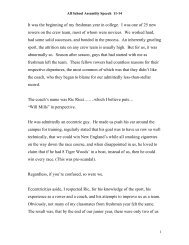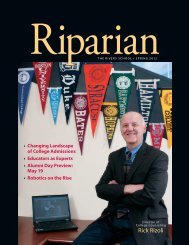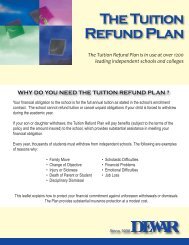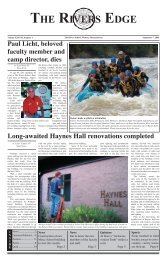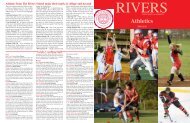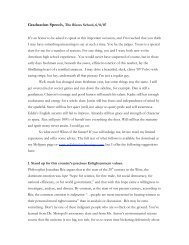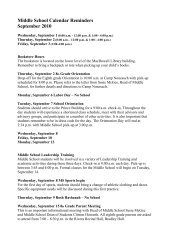You also want an ePaper? Increase the reach of your titles
YUMPU automatically turns print PDFs into web optimized ePapers that Google loves.
Alumni Profile<br />
Jim Lowell ’79, P’15:<br />
A Positive Take on America’s Future<br />
By Christine Martin<br />
Jim Lowell has been analyzing the<br />
stock market for more than twenty<br />
years as editor of Fidelity Investor,<br />
ETF Trader, and <strong>The</strong> Rankings Service;<br />
chief investment strategist for Adviser<br />
Investments; and president of Fundworks,<br />
Inc. He is the author of several books on<br />
investing as well as a steady stream of poetry<br />
and appears regularly on Marketwatch<br />
and NECN. Jim will be the recipient of the<br />
Alumni Excellence Award at the Reunion<br />
Dinner at <strong>Rivers</strong> on May 16.<br />
We caught up with him recently and<br />
found a bit of optimism in his outlook for<br />
America’s financial future.<br />
When the Riparian interviewed you in<br />
2002, the market was reeling in the<br />
aftermath of 9/11. Where are we today<br />
<strong>The</strong> current crisis is unprecedented in<br />
scope and scale. It has shaken not simply<br />
companies and even industries to their<br />
core, but it has underscored a pervasive<br />
sense of helplessness and hopelessness<br />
which has shaken investors to their core<br />
beliefs in investing. It is not the belief that<br />
Capitalism has hit an iceberg, it is more a<br />
sense that perhaps Capitalism was the iceberg<br />
to begin with. Nothing feels safe. No<br />
assumptions are secure. It is, as the German<br />
Romantic philosopher G.W.F. Hegel<br />
once quipped, “<strong>The</strong> night in which all cows<br />
are black.” That being the case, I take solace<br />
from history’s unyielding desire to repeat<br />
itself; better days will turn up. Between<br />
now and then, I’d recommend watching<br />
the news with the sound off and taking any<br />
sound bite about our current predicament<br />
with more than a grain of salt. Put it another,<br />
more hopeful way—Holderlin, in his<br />
poem Patmos, proposes, “Wo aber Gerfahrist,<br />
wachst/Das Rettende auch”—where danger<br />
lies, there the saving ground presents itself.<br />
Has your own “belief system” in investing<br />
changed drastically<br />
Since my awakening at <strong>Rivers</strong> in 1977, my<br />
own belief system continues to evolve; the<br />
market has a random chance of uplifting or<br />
upbraiding my views, no matter how well<br />
considered they are. I’m a staunch advocate<br />
of diversification among types of investments<br />
across different asset classes to better<br />
account for the fact that today’s sage is<br />
often tomorrow’s fool. I have also always<br />
focused at least as much of my time and attention<br />
on managing risk as I have on delivering<br />
return. I enlist a unique tool and<br />
perspective in my pursuits: one of my companies<br />
holds the largest proprietary database<br />
of individual manager track records.<br />
This database allows me to answer a key<br />
question: which managers have (or lack)<br />
the skill sets to manage whatever environment<br />
we’re in. Currently, I’m focused on<br />
managers who weathered the 1989-1992<br />
real-estate led banking crisis and resultant<br />
market meltdown well. Cleverness and<br />
luck are haphazard. Knowledge, intelligence,<br />
and experience matter.<br />
Overconsumption has received its share<br />
of the blame, and yet we’re told to start<br />
buying again to get the economy going<br />
Where’s the healthy balance<br />
We’re witnessing the convergence of several<br />
types of overindulgence and the desire<br />
to first control then better manage them.<br />
Whether it’s our culture’s ironic obsession<br />
with obesity and celebrity chefs, or Washington’s<br />
command for obeisance to fiscal<br />
conservatism and profligate stimulus, or<br />
Wall Street’s projection of prudence and<br />
pell-mell pursuit of profits, a healthy balance<br />
is hard to find. In such moments of<br />
imbalance, however, we all learn the necessity<br />
of balancing acts as opposed to merely<br />
acting balanced. That’s a healthy inclination.<br />
At the end of the day, I believe that<br />
we’ll be in better shape for having gone<br />
through this current crucible. Meister Eckhardt’s<br />
plaint that ‘pain is the quickest beast<br />
to carry you to perfection’ rings true. So<br />
does Chevy Chase’s Ty Webb quip in Caddyshack,<br />
“A flute with no holes is not a<br />
flute;” the sour, sub-prime note of products<br />
that claimed to be one thing, turning out to<br />
be nothing, are nothing new. Neither is the<br />
fact that good and bad policies may get unjustly<br />
punished or rewarded; that’s politics.<br />
But the bottom line for investors will be<br />
that good companies will survive based on<br />
being able to balance, rather than cook,<br />
their books. And, as my daughter knows<br />
thanks to her 6th grade Latin teacher, Ms.<br />
Favreau, caveat emptor.<br />
10 • Riparian • Spring 2009


